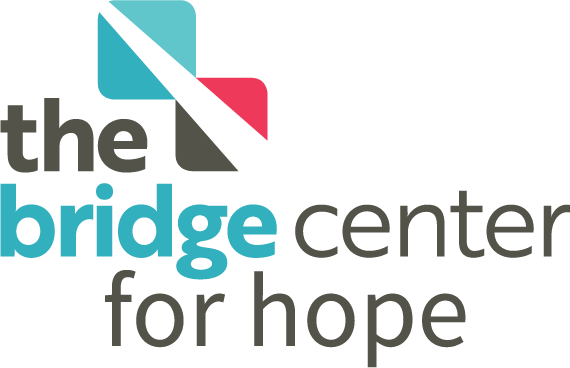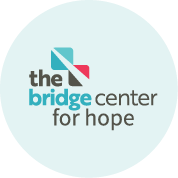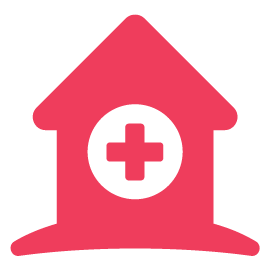Facility-based services that operate 24 hours a day, 7 days a week as a walk-in crisis center providing short-term behavioral health crisis intervention on a voluntary basis (similar to crisis chairs in a CRC/CSU).

Behavioral Health Crisis Center (BHCC)

Bridge Center for Hope Facility
Offers a range of crisis stabilization and crisis care services, including a crisis observation unit, a short-term psychiatric unit, a withdrawal management and detoxification unit, and a mobile crisis unit, to create the right pathways to treatment for people in crisis and to link providers to create an integrated continuum of care from prevention to rehabilitation.
Campus of Connection
A care model used by RI International that includes a strong peer workforce and surrounds the individual with support on their journey towards recovery.
Care-Management Team
A peer navigation team that assists guests post-discharge with ongoing peer support services and provides linkage for guests to outpatient services and appropriate community resources.
Co-Occurring Disorders
A combination of two or more substance use disorders and mental and behavioral health conditions.
“Crisis Now” Model
An evidence-based, nationally endorsed approach to crisis care that seeks to prevent suicides, provide immediate help for those in distress, reduce the cost of care, and reduce the strain on emergency rooms, prisons, and law enforcement.
Crisis-Stabilization Care
A crisis-receiving facility provides crisis stabilization services to people in need of urgent care for mental health issues or a substance use disorder or both. Similar to an emergency room, a facility-based, walk-in crisis center provides short-term, behavioral health crisis intervention, offering a community-based, voluntary, home-like environment as an alternative to more restrictive settings.
Crisis Receiving Center (CRC) or Crisis Stabilization Units (CSUs)
Small, inpatient facilities of 16 or more crisis chairs and/or beds for people in a mental health crisis whose needs cannot be met safely in residential service settings. CRCs/CSUs may be designed to admit on a voluntary or involuntary basis when the person needs a safe, secure environment that is less restrictive than a hospital. CSUs try to stabilize the person and get him or her back into the community quickly.
Formal Voluntary Admission
The admission of a person suffering from a mental health or substance-related or addictive disorder desiring admission to a treatment facility for diagnosis or treatment of such condition, which may be formally admitted upon his/her written request. At any point during the treatment process, an individual who was initially admitted to the facility on an Order of Protective Custody (OPC) can be changed to an FVA.

Medically Monitored Residential Detoxification Program
An organized regimen of services provided by nursing and medical professionals, which provides for 24-hour medically supervised alcohol or other drug withdrawal management with medication approved for such use.
Mental Health or Substance Use Crisis
Occurs when a person’s behavior changes in such a way that it could put themselves or others at risk of hurting themselves or being unable to function normally in daily life.
Mobile Crisis Response
A service that is available as an initial intervention for individuals in a self-identified crisis, in which a team composed of a mental health professional and a peer support specialist is deployed to where the individual is located to offer intervention or stabilization services in the community.
“No Wrong Door” Policy
Ensures guests receive the treatment they need regardless of how they enter the facility. Guests can walk directly into our facility located at 3455 Florida Street or be escorted by a friend or family member at any time day or night. If a person in crisis encounters law enforcement or a first responder, or dials 911, he or she can request to be taken to the Bridge Center for immediate treatment. No referral is needed and no guest is turned away.
Order of Protective Custody (OPC)
An order for a person to be taken into protective custody and transported to a treatment facility to be assessed by nurses, licensed mental health professionals, psychiatric nurse practitioners, or psychiatrists to determine if the individual meets one of the three criteria: a danger to self, others, or gravely ill. If one of the three criteria applies, the treating physician issues a physician emergency certificate, and the guest remains involuntarily committed.

RI International
An international non-profit behavioral health organization that provides a range of mental health, substance use, and crisis services since 1990 throughout the United States and abroad selected by the Bridge Center Board of Directors to operate as the service provider for the facility.
Short-Term Psychiatric or Crisis Stabilization (CS) Units
Short-term bed-based crisis treatment and support services for members who have received a lower level of crisis services and are at risk of hospitalization or institutionalization.
Substance Use Disorder
Occur when the recurrent use of alcohol and/or drugs causes clinically significant impairment, including health problems, disability, and failure to meet major responsibilities at work, school, or home.
Trauma-Informed Care
Recognizes and responds to the signs, symptoms, and risks of trauma to better support the health needs of patients who have experienced Adverse Childhood Experiences (ACEs) and other types of trauma that can impact their mental well-being.

Withdrawal Management Unit
Unit offering medication-assisted treatment (MAT) and medical detoxification services. MAT is specifically designed for guests who are being treated for opioid use and utilizes specialized medications.







